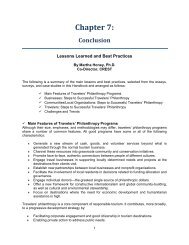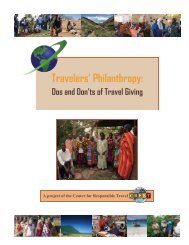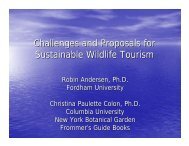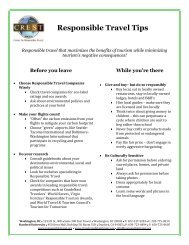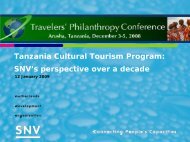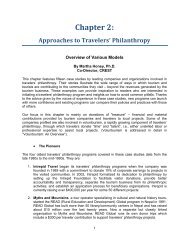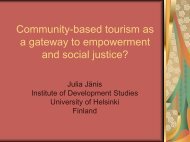- Page 1 and 2:
Travelers’ Philanthropy HandbookP
- Page 3 and 4:
AcknowledgementsThe idea to do this
- Page 5 and 6:
Read What The Experts Say AboutThe
- Page 7 and 8:
ForewordBy Wangari Maathai, Ph.D.Fo
- Page 9 and 10:
Chapter 1:Core Components of Travel
- Page 11 and 12:
and institutions is crucial for add
- Page 13 and 14:
The attendance figures from our two
- Page 15 and 16:
little flows directly to community-
- Page 17 and 18:
surprisingly little information ava
- Page 19 and 20:
Travelers’ Philanthropy and the G
- Page 21 and 22:
organization try to drive the chang
- Page 23 and 24:
in place, truly beneficial, success
- Page 25 and 26:
What is Successful Philanthropy?By
- Page 27 and 28:
Travelers’ philanthropy involves
- Page 29 and 30: 8. Institutionalize Regular Evaluat
- Page 31 and 32: Chapter 2:Approaches to Travelers
- Page 33 and 34: Other international companies have
- Page 35 and 36: and/or travelers are encouraged to
- Page 37 and 38: donors, and monitor projects. IGTOA
- Page 39 and 40: ooooOperating as a not-for-profit o
- Page 41 and 42: desire to donate. Giving to these c
- Page 43 and 44: Myths and Mountains and READ Global
- Page 45 and 46: with a secondary school and a hub o
- Page 47 and 48: ooooooTwice a year, READ sends a le
- Page 49 and 50: International Galapagos Tours Opera
- Page 51 and 52: • Do You Incorporate Tax Deductib
- Page 53 and 54: Holbrook Travel and Sarapiqui Conse
- Page 55 and 56: service projects, done together wit
- Page 57 and 58: • How Much Has Been Raised?Most f
- Page 59 and 60: Committee brings key staff from Hot
- Page 61 and 62: Rock Resorts and Vail ResortsBy Jul
- Page 63 and 64: National Park Foundation; Hyde Stat
- Page 65 and 66: Villages of Loreto Bay and Loreto B
- Page 67 and 68: • Sustainable DevelopmentThe Foun
- Page 69 and 70: we brought tourism to these communi
- Page 71 and 72: strong ethical understanding, a str
- Page 73 and 74: eginning. It has not been an easy r
- Page 75 and 76: northern Manhattan. Our diners, our
- Page 77 and 78: • How are Funds Distributed? What
- Page 79: vendors, our guests, and our establ
- Page 83 and 84: study-abroad courses in a range ofs
- Page 85 and 86: and projects to support and then Gi
- Page 87 and 88: Clients traveling on customized iti
- Page 89 and 90: GoPhilanthropic was founded in resp
- Page 91 and 92: • Are Donations Tax Deductible?We
- Page 93 and 94: Case Study 1: Corporations Weaving
- Page 95 and 96: Elevate DestinationsBy Dominique Ca
- Page 97 and 98: • How are Funds Actually Raised f
- Page 99 and 100: • Has Your Philanthropic Program
- Page 101 and 102: Tourism has brought some benefits t
- Page 103 and 104: where many local community activiti
- Page 105 and 106: Chapter 3:VoluntourismVoluntourism:
- Page 107 and 108: Voluntourism has emerged from this
- Page 109 and 110: Box 2:Voluntourism in Meetings and
- Page 111 and 112: Advice for Potential Voluntourists
- Page 113 and 114: Your ISA should include personal qu
- Page 115 and 116: PAQsPAQ 1PAQ 2PAQ 3PAQ 4PAQ 5PAQ 6P
- Page 117 and 118: Look for the little things that you
- Page 119 and 120: Consumer Interest in VoluntourismCo
- Page 121 and 122: Chapter 4:Engaging Tourism Business
- Page 123 and 124: Possibly your project(s) will cover
- Page 125 and 126: your project and activities along t
- Page 127 and 128: Principle 4: Follow all applicable
- Page 129 and 130: Working with Donors in Travel-based
- Page 131 and 132:
concerns have been raised about the
- Page 133 and 134:
sustained local communities by targ
- Page 135 and 136:
where it might be more relevant to
- Page 137 and 138:
13. Cost effectivenessProject execu
- Page 139 and 140:
evaluation, and audited data. Finan
- Page 141 and 142:
heading with travelers’ philanthr
- Page 143 and 144:
Naboisho Conservancy, the private r
- Page 145 and 146:
Comments from a Travel Partner on C
- Page 147 and 148:
The Ask ─ Or is it the Offer?By S
- Page 149 and 150:
5. What factors or circumstances wo
- Page 151 and 152:
deciding whether to donate, but rat
- Page 153 and 154:
tax deductibility or other financia
- Page 155 and 156:
their part simply by choosing to tr
- Page 157 and 158:
United States. Tourists stay an ave
- Page 159 and 160:
“We want to help provide educatio
- Page 161 and 162:
Chart 6. Since when are you support
- Page 163 and 164:
Those surveyed also criticized volu
- Page 165 and 166:
Readiness Check List for Businesses
- Page 167 and 168:
not infringe on travelers’ holida
- Page 169 and 170:
the traveler is given hope, empower
- Page 171 and 172:
ooVolunteers who work with children
- Page 173 and 174:
Survey of Recipient Organizations i
- Page 175 and 176:
sources beyond tourism, in many cas
- Page 177 and 178:
confirmed that visiting the project
- Page 179 and 180:
The School of St. Jude: What Can I
- Page 181 and 182:
• Space books and thing that live
- Page 183 and 184:
Unwanted PhilanthropyThe Paint Synd
- Page 185 and 186:
Chapter 6:Engaging Travelers in Tra
- Page 187 and 188:
greater interest and attention to d
- Page 189 and 190:
them, a precedent they value. Its c
- Page 191 and 192:
The dependency I’m talking about
- Page 193 and 194:
to me as an option. Besides, it’s
- Page 195 and 196:
conditions for it. If a tourist is
- Page 197 and 198:
Consumer Demand for Travelers’ Ph
- Page 199 and 200:
Why Travelers Become Philanthropist
- Page 201 and 202:
• What Form of Communications was
- Page 203 and 204:
My Role as a Guide in Promoting Tra
- Page 205 and 206:
Legal Issues: Incentives to Give 59
- Page 207 and 208:
• For German Taxpayers 64A donor
- Page 209 and 210:
• For German TaxpayersLike U.S. c
- Page 211 and 212:
4. What Kind of Documentation Do I
- Page 213 and 214:
Chapter 7:ConclusionLessons Learned
- Page 215 and 216:
. Learn about and engage with the c
- Page 217 and 218:
c. Funds can be given:o Directly to
- Page 219 and 220:
efreshments, etc. This should be ne
- Page 221 and 222:
3. For Those Considering Voluntouri
- Page 223 and 224:
Additional ResourcesThe following a
- Page 225 and 226:
Nurturelakeland: http://www.nurture
- Page 227 and 228:
Biographies of AuthorsNot included
- Page 229 and 230:
Lars Lindkvist, Ph.D., is director
- Page 231 and 232:
David (Jonah) Western, Ph.D., is fo
- Page 233 and 234:
CREST’s Travelers’ Philanthropy
- Page 235 and 236:
2Travelers’ Philanthropy: Dos and
- Page 237 and 238:
4When visitors suggest:“Let’s v
- Page 239 and 240:
6When visitors inquire:“Can we vi
- Page 241 and 242:
8When visitors ask:“Should I brin
- Page 243 and 244:
10“Giving Time, Talent and Treasu
- Page 245 and 246:
12Center on Ecotourism and Sustaina
- Page 247 and 248:
Volunteer Tourism Effective Practic
- Page 249 and 250:
IPARTNER ORGANIZATIONSAND HOST COMM
- Page 251 and 252:
IPARTNER ORGANIZATIONSAND HOST COMM
- Page 253 and 254:
IIVOLUNTEER PROJECTS4. Design proje
- Page 255 and 256:
IIVOLUNTEER PROJECTS6. Consider the
- Page 257 and 258:
IIIPARTICIPANTS8. Provide informati
- Page 259 and 260:
VRESPONSIBLE TOURISM10. Exemplify,




